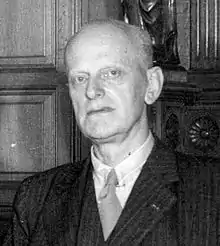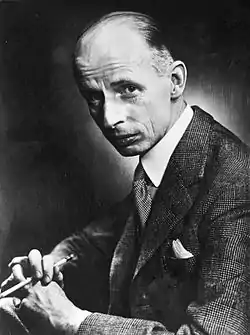First Beel cabinet
The First Beel cabinet was the executive branch of the Dutch Government from 3 July 1946 until 7 August 1948. The cabinet was formed by the christian-democratic Catholic People's Party (KVP) and the social-democratic Labour Party (PvdA) after the election of 1946. The cabinet was a centrist grand coalition and had a substantial majority in the House of Representatives with prominent Catholic politician Louis Beel serving as Prime Minister and dual served as Minister of the Interior continuing from the previous cabinet. Labour Leader Willem Drees continued as Deputy Prime Minister and Minister of Social Affairs from the previous cabinet.
| First Beel cabinet | |
|---|---|
42nd Cabinet of the Netherlands | |
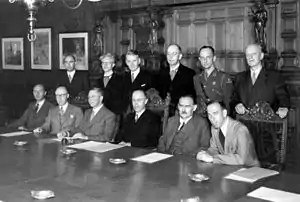 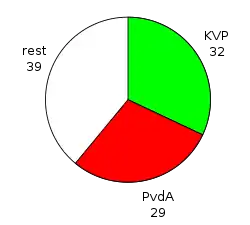 First meeting of the cabinet at the Ministry of General Affairs on 3 July 1946 | |
| Date formed | 3 July 1946 |
| Date dissolved | 7 August 1948 2 years, 35 days in office (Demissionary from 7 July 1948) |
| People and organisations | |
| Monarch | Queen Wilhelmina |
| Prime Minister | Louis Beel |
| Deputy Prime Minister | Willem Drees |
| No. of ministers | 17 |
| Total no. of members | 19 |
| Member party | Catholic People's Party (KVP) Labour Party (PvdA) |
| Status in legislature | Centrist Majority government (Grand coalition/Roman-Red) |
| Opposition party | Anti-Revolutionary Party |
| Opposition leader | Jan Schouten |
| History | |
| Election(s) | 1946 election |
| Outgoing election | 1948 election |
| Legislature term(s) | 1946–1948 |
| Incoming formation | 1946 formation |
| Outgoing formation | 1948 formation |
| Predecessor | Schermerhorn–Drees cabinet |
| Successor | Drees–Van Schaik cabinet |
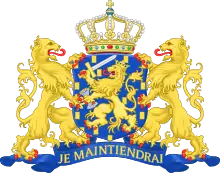 |
|---|
| This article is part of a series on the politics and government of Netherlands |
The cabinet served during early years of the post-war 1940s. Domestically the beginning of the recovery and rebuilding following World War II continued with the Marshall Plan, it was also to implement several major social reforms to social security. Internationally the beginning of the decolonization of the Dutch East Indies was continued. The cabinet suffered no major internal and external conflicts. Following a major revision of the constitution a snap election was called to simultaneously elect a new parliament. Following the election the cabinet continued in a demissionary capacity until it was replaced with the Drees–Van Schaik cabinet.[1][2]
Term
A major issue was the independence of the Dutch East Indies. This required a change in the constitution. In November 1946 the Linggadjati Agreement was signed, but different interpretations led to Dutch military intervention (politionele acties). Under international pressure through the UN, this ended and negotiations restarted, ultimately resulting in the new country Indonesia, but only under the next cabinet, Drees I. An important new law was the 'Noodwet Ouderdomsvoorziening' by Deputy Prime Minister and Minister of Social Affairs Willem Drees.
Cabinet Members
- Resigned
- Retained from the previous cabinet
- Continued in the next cabinet
- Acting
- Ad Interim
- Ministry renamed
- Medical leave of absence from 30 August 1947 until 3 November 1947
- Appointed as Ambassador to the United States and the United Nations
Trivia
- Six cabinet members had previous experience as scholars or professors: Louis Beel (Administrative Law), Piet Lieftinck (Financial and Business Economics), Jan van den Brink (Public Economics and Economical Statistics), Jos Gielen (Philology and Education Sociology), Johan Ringers (Hydraulic and Structural Engineering) and Joris in 't Veld (Public Administration).
- The age difference between oldest cabinet member Johan Ringers (born 1885) and the youngest cabinet member Jan van den Brink (born 1915) was 30 years, 100 days.
- Louis Beel became the youngest Dutch Prime Minister at the age of 44 years, 82 days, a record that was broken in 1982 by Ruud Lubbers.
- Jan van den Brink became the youngest Dutch Minister at the age of 32 years, 283 days.
References
- "Coalities tussen sociaaldemocraten en confessionelen" (in Dutch). Historisch Nieuwsblad. 10 August 2006. Retrieved 24 April 2018.
- F.J.F.M. Duynstee; J. Bosmans (1977). Parlementaire geschiedenis van Nederland na 1945 , deel 1, Het kabinet-Schermerhorn-Drees (1945-1946). Van Gorcum. p. 5. ISBN 90-232-1412-9.
External links
- Official
- (in Dutch) Kabinet-Beel I Parlement & Politiek
- (in Dutch) Kabinet-Beel I Rijksoverheid
| Wikimedia Commons has media related to Cabinet Beel I. |
.jpg.webp)

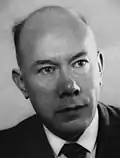
.jpg.webp)

.jpg.webp)
.jpg.webp)
.jpg.webp)
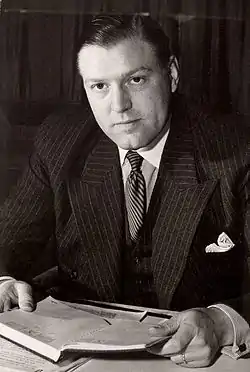
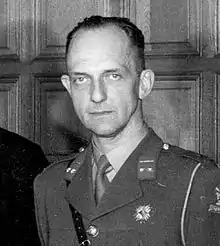
.jpg.webp)
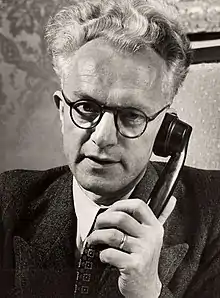
.jpg.webp)
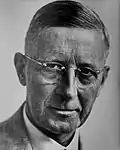
.jpg.webp)
.jpg.webp)
